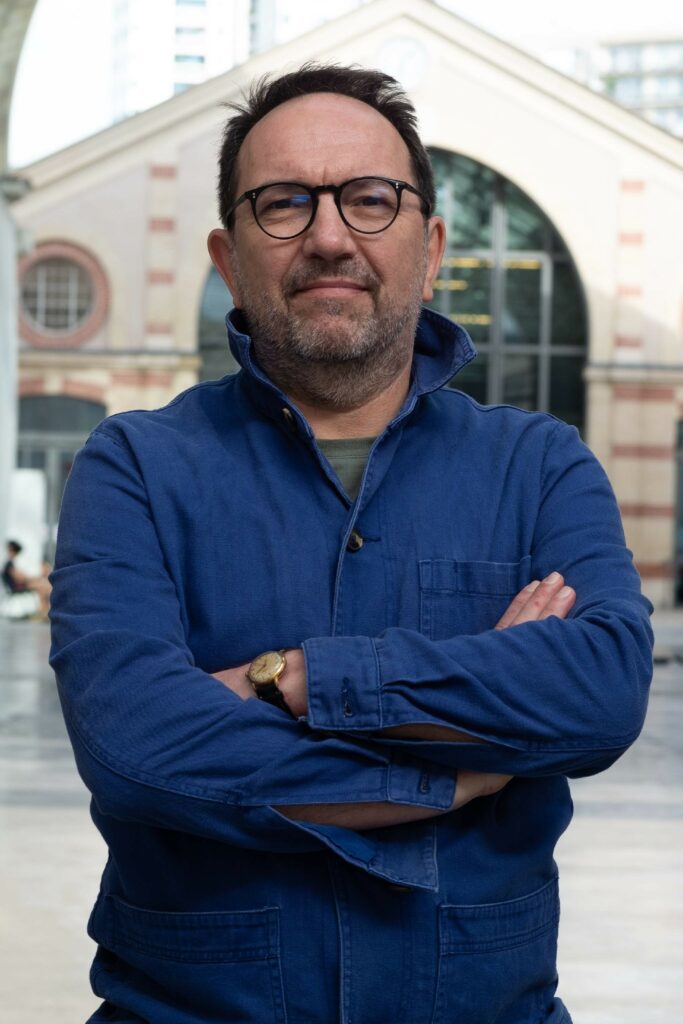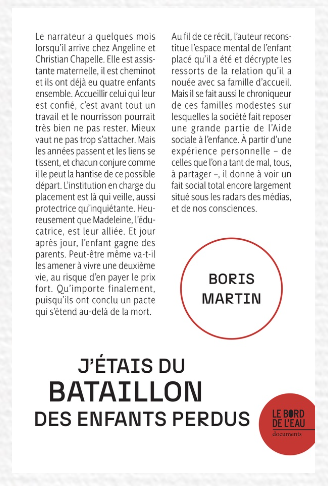To promote interactions between humanitarian actors and researchers in the social sciences and humanities, the French Red Cross Foundation regularly organizes “Pause Culture Recherche“ at the headquarters of the French Red Cross.
Our ambition is to concretely bridge research and society through shared experiences and collaborations between researchers, humanitarian and social actors, and even artists.
Presentation
For this 8th edition, Boris Martin, editor-in-chief of the journal Alternatives Humanitaires, will present his latest book, J’étais du bataillon des enfants perdus (Editions Le Bord de l’eau, 2024). After several works dedicated to humanitarian action, including L’Adieu à l’humanitaire ? Les ONG au défi de l’offensive néolibérale (Editions Charles Léopold Mayer, 2015), he now offers a “personal, social, and literary” account that questions contemporary child protection practices.
« Three hundred thousand minors or young adults currently depend on child welfare services. Seventy percent of them have no diploma. One in four homeless people is said to be a former foster child. Thirty percent of juvenile offenders have followed the same path. So, “lost” by whom ? Lost for what ? I have no intention of raising the banner and positioning myself as a defender of this lineage of the lineage-less. I’m just a low-ranking soldier who found a safe hideout. But my story is intertwined with all the others. Telling it means lifting a corner of the veil covering this ghost regiment, even if it’s only my story. » It’s a story we think we already know. Because it has inspired countless books and films, because television has often exploited it, the image of the abandoned child—wandering from abusive institutions to overwhelmed foster families—has ended up creating its own clichés. And yet, other stories exist
Boris Martin is only a few months old when he arrives at the home of Angeline and Christian Chapelle. She is a childminder, he is a railway worker, and they already have four children together. Taking in the child entrusted to them is, above all, a job, and the infant may very well not stay. It’s best not to get too attached. But as the years go by, bonds form, and each one finds their own way of warding off the looming fear of his possible departure. The child protection association overseeing the placement watches closely-both protective and unsettling. Thankfully, Madeleine, the social worker, is on their side. And day by day, the child gains parents. Perhaps he will even lead them into a second life-though not without its price.
Through this narrative, Boris Martin reconstructs the mental landscape of the foster child he once was and unravels the dynamics of the bond he formed with his foster family. But he also becomes a chronicler of the working-class families on whom society places much of the burden of child welfare services. Drawing from personal experience, he sheds light on a deeply entrenched social reality-one that remains largely overlooked by the media and absent from our collective awareness.
« Stay, make sure nothing changes, dodge the threat that this strange entity seemed to hold over my head—that’s all I ever did. Living without realizing I was in survival mode, turning kindness into a form of passive resistance, accumulating day after day the signs that I would not be sent back to the mother house. To the terminus of lost children. »
Join us at Campus Croix-Rouge française on :
Wednesday, March 5, 2024
1:00 PM – 2:30 PM at 21 rue de la Vanne, 92120 Montrouge
21 | Social Innovation Accelerator – 1st Floor
Free admission but registration is compulsory. This event is entirely face-to-face and is not part of a hybrid format. There will be no replay.
Program
- 1:00 PM – 1:05 PM : Guest Introduction – Vincent Leger, Research Officer, French Red Cross Foundation
- 1:05 PM – 1:35 PM : « From a Child Protection Association to International NGOs : The Journey of a Former Member of the Battalion of Lost Children » – Boris Martin
- 1:35 PM – 2:30 PM : Q&A and Discussion with the Audience
The guest

After studying law and legal anthropology, Boris Martin committed himself to academic research, writing, and humanitarian work. He is the editor-in-chief of Alternatives Humanitaires, an independent editor-rewriter, and an author. He has published essays, stories, and fiction, some of which have been translated into English, Chinese, Japanese, and German.
He began writing with a desire to understand—and to help others understand. The Gulf War in 1991 marked the beginning of his writing journey when he penned an article for a university journal, criticizing the apathy of students.
His research topics and his “gentle activism” would later guide his writing, with essays focusing on issues of solidarity and humanitarian work. But the need to tell stories, to show and suggest, and his desire to write in a lighter, more narrative style soon caught up with him. He published stories that blend text with photography, exploring themes of travel, quest, and memory. Later, these ideas evolved into a work of fiction where the heroine, suffering from Alzheimer’s, returns one last time to her childhood city, Hong Kong.
In 2014, he published L’iconoclaste, the “true-novel” of Auguste François, a consul, photographer, and adventurer who traveled through Indochina, Paraguay, and China. When he’s not writing for himself, he lends his pen to others, revising manuscripts, infusing rhythm, or telling new stories. In 2008, he adapted the Chinese bestseller The Wolf Totem by Jiang Rong for a French audience, which was later made into a film by Jean-Jacques Annaud in 2015 under the title The Last Wolf (https://www.boris-martin-incipit.com). In 2020, he wrote the history of Médecins du Monde : La belle histoire.
Bibliography
Essays :
- L’adieu à l’humanitaire ? Les ONG au défi de l’offensive néolibérale, Éditions Charles Léopold Mayer, November 2015 (summary and free download of the full book: https://www.eclm.fr/livre/l-adieu-a-l-humanitaire)
- Droits de l’Homme et responsabilités (with Sandrine Revet and Bertrand Verfaillie), Éditions Charles Léopold Mayer and Tarik Éditions, 2007
- Critique de la raison humanitaire (edited with Karl Blanchet, preface by Rony Brauman), Éditions Le Cavalier Bleu, 2006 (translated into English by Hurst and Company, July 2011 [UK], and Columbia University Press, September 2011 [USA and Canada])
- Voyager autrement – Vers un tourisme responsable et solidaire ((editor), Éditions Charles Léopold Mayer, 2003
- Quand le droit fait l’école buissonnière – Pratiques populaires de droit (with Patricia Huyghebaert), Éditions Descartes & Cie, Éditions Charles Léopold Mayer, 2002
- La France de la solidarité, Éditions Cesno, 2002
Recits :
- J’étais du Bataillon des enfants perdus, Le Bord de l’Eau, 2024.
- L’iconoclaste. L’histoire véritable d’Auguste François, consul, photographe, explorateur, misanthrope, incorruptible et ennemi des intrigants, Les éditions du Pacifique, 2014
- Chronique d’un monde disparu, Seuil, 2008 (translated into German by Frederking & Thaler and into Japanese by Tuttle-Mori/National Geographic in 2009)
- « C’est de Chine que je t’écris… », Seuil, 2004 (translated into Chinese, Hunan Publishing Group, May 2005)
Fiction :
- Hong Kong. Un parfum d’éternité, Elytis, 2010

Click on the image to discover the book (publisher’s website)
In Partnership With






